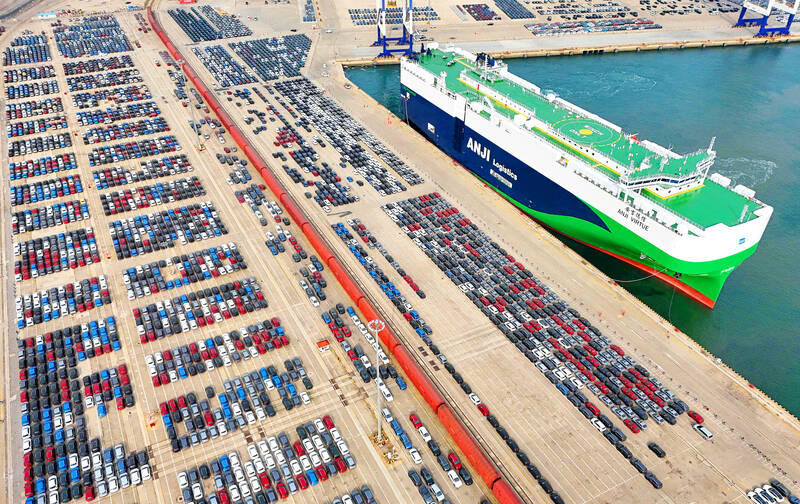The US unveiled new port fees on Chinese-built and operated ships on Thursday, in a bid to boost the domestic shipbuilding industry and curb China’s dominance in the sector.
The move — which stems from a probe launched under the prior administration — comes as the US and China are locked in a major trade war over US President Donald Trump’s tariffs and could further ratchet up tensions.
“Ships and shipping are vital to American economic security and the free flow of commerce,” US Trade Representative Jamieson Greer said in a statement announcing the new fees, most of which would begin in mid-October.

Photo: AFP
Under the new rule, per tonnage or per container fees would apply to each Chinese-linked ship’s US voyage, and not at each port as some in the industry had worried.
The fee would be assessed only up to five times per year, and could be waived if the owner places an order for a US-built vessel.
Dominant after World War II, the US shipbuilding industry has gradually declined and now accounts for just 0.1 percent of global output.
The sector is now dominated by Asia, with China building nearly half of all ships launched, ahead of South Korea and Japan.
The three Asian countries account for more than 95 percent of civil shipbuilding, according to UN figures.
There would be separate fees for Chinese-operated ships and Chinese-built ships, and both would gradually increase over subsequent years.
For Chinese-built ships, the fee starts at US$18 per net tonne or US$120 per container — meaning a ship with 15,000 containers could see a whopping fee of US$1.8 million.
US groups representing some thirty industries had voiced their concerns in March about the risks such fees could have on the prices of imported products.
One business surveyed by the groups expressed worry that proposed fees, alongside tariffs on China and other countries, as well as duties on steel and aluminum imports, would put “extraordinary pressure on US retailers.”
All non-US-built car carrier vessels would also be hit with a fee beginning in October.
Washington is also introducing new fees for liquefied natural gas (LNG) carriers, although those do not take effect for three years.
A fact sheet accompanying the announcement said fees would not cover “Great Lakes or Caribbean shipping, shipping to and from US territories, or bulk commodity exports on ships that arrive in the United States empty.”
In addition to the fees, Greer also announced proposed tariffs on some ship-to-shore cranes and on Chinese cargo handling equipment.
“The Trump administration’s actions will begin to reverse Chinese dominance, address threats to the US supply chain, and send a demand signal for US-built ships,” Greer said.
China warned yesterday that new US port fees on Chinese-built and operated ships would be “detrimental to all parties,” as Washington seeks to boost its domestic shipbuilding industry and curb Beijing’s dominance in the sector.
“They drive up global shipping costs [and] disrupt the stability of global production and supply chains,” Chinese Ministry of Foreign Affairs spokesman Lin Jian said, adding: “They will not succeed in revitalizing the US shipbuilding industry.”

To many, Tatu City on the outskirts of Nairobi looks like a success. The first city entirely built by a private company to be operational in east Africa, with about 25,000 people living and working there, it accounts for about two-thirds of all foreign investment in Kenya. Its low-tax status has attracted more than 100 businesses including Heineken, coffee brand Dormans, and the biggest call-center and cold-chain transport firms in the region. However, to some local politicians, Tatu City has looked more like a target for extortion. A parade of governors have demanded land worth millions of dollars in exchange

An Indonesian animated movie is smashing regional box office records and could be set for wider success as it prepares to open beyond the Southeast Asian archipelago’s silver screens. Jumbo — a film based on the adventures of main character, Don, a large orphaned Indonesian boy facing bullying at school — last month became the highest-grossing Southeast Asian animated film, raking in more than US$8 million. Released at the end of March to coincide with the Eid holidays after the Islamic fasting month of Ramadan, the movie has hit 8 million ticket sales, the third-highest in Indonesian cinema history, Film

Taiwan Semiconductor Manufacturing Co’s (TSMC, 台積電) revenue jumped 48 percent last month, underscoring how electronics firms scrambled to acquire essential components before global tariffs took effect. The main chipmaker for Apple Inc and Nvidia Corp reported monthly sales of NT$349.6 billion (US$11.6 billion). That compares with the average analysts’ estimate for a 38 percent rise in second-quarter revenue. US President Donald Trump’s trade war is prompting economists to retool GDP forecasts worldwide, casting doubt over the outlook for everything from iPhone demand to computing and datacenter construction. However, TSMC — a barometer for global tech spending given its central role in the

Alchip Technologies Ltd (世芯), an application-specific integrated circuit (ASIC) designer specializing in server chips, expects revenue to decline this year due to sagging demand for 5-nanometer artificial intelligence (AI) chips from a North America-based major customer, a company executive said yesterday. That would be the first contraction in revenue for Alchip as it has been enjoying strong revenue growth over the past few years, benefiting from cloud-service providers’ moves to reduce dependence on Nvidia Corp’s expensive AI chips by building their own AI accelerator by outsourcing chip design. The 5-nanometer chip was supposed to be a new growth engine as the lifecycle